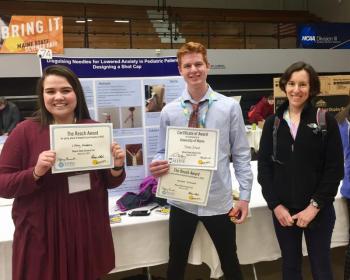When the college-bound become home-bound
Many Boothbay Region High School alumni have returned to the peninsula as colleges and universities concentrate on keeping students home to practice social distancing during the COVID-19 pandemic. BRHS College Access Coordinator Hannah Johnson said she has been reaching out to post-secondary alumni letting them know she is still a resource for them, especially students who cannot or do not wish to stay with their families.
“… Mostly I'm hearing that folks are glad their universities have taken such precautions … (but) I think there's a general melancholic feeling from the kids who were away at college having a great time, loving their classes and professors and now they are left in the lurches of learning online …”
Johnson said each university has come up with its own policies. Some have decided to move classes online as a requirement while others have decided to cancel the semester. Ultimately, the complications come from required internships, labs and other assignments required for graduating, Johnson said.
BRHS alumna Page Brown is a sophomore at the University of Maine in Farmington for her degree in secondary education with a concentration in social studies, English and English Language Learner. Brown said the sudden shift to online classes will affect her overall educational experience as education majors are required to take practicum – a semester-long course which puts students in a public school classroom to teach their subjects.
“… I was at Mount Blue, teaching social studies for high schoolers and we had just completed the first three weeks called ‛Field One.’ Field Two was scheduled to begin after spring break … My field placement requirements (practicum) were waived, as the high schools are closed.”
Brown said many assignments have been significantly altered since education students cannot teach the lesson plans they prepare or write reports on their field experiences. This will mean the only practical experience Brown’s class will have by graduation is placement in a class during their senior year when they present their research at a symposium and receive their teaching licenses.
“My biggest concern is losing the classroom experience of practicum … Losing out on things such as developing my teaching philosophy or how to manage a classroom is frustrating, yet knowing that I have a full semester ahead of me in two years is reassuring.”
Despite the new challenges, professors have been helpful in the transition and in accommodating students. UMF has been in touch daily with resources, pass/fail options and aid for student workers, said Brown. The transition was hardest for professors since they had only spring break to redo an entire curriculum and syllabus while reassuring panicking students and keeping them connected.
“The pandemic has been hard for so many different avenues; however the amount of compassion being displayed is pretty amazing. It actually has been fascinating to a certain degree as an upcoming educator to see the massive overhaul and shift on instruction. From elementary teachers to college professors, all have put in an incredible amount of effort to ensure the students stay on target learning-wise. It is very impressive and proves just how amazing educators are … and I am confident students will still find ways to be successful.”
BRHS alumna Lilley Harris, a freshman at Yale University majoring in cellular, molecular and developmental biology, said her university was fairly quick to react to COVID-19 as it has many students from all over the world. At the same time, Yale was cautious in its approach to educate students and faculty on the gravity of the virus. As the virus became more serious in larger areas like New York City, which is only one and a half hours from Yale’s campus, students heard rumors a day before spring break of department heads meeting to discuss plans of moving courses online.
“When the decision was made to have the rest of the spring semester conducted online, we were on spring break and were instructed not to return to campus to retrieve our belongings,” Harris said. Many of her belongings are still on campus. “ I’ve received no information on how or when I will be able to gather them. However, the administration has been accommodating and offered to send home essential items …”
Learning online has been a steep learning curve for everyone, Harris said. Classes are now meeting on Zoom, which has been a struggle for her and other classmates who have weak WiFi and have audio and video cutting out periodically as a result. One of the better ways Yale and other universities are adapting to these changes is implementing a universal pass system or relaxing grading policies, said Harris.
“Before COVID-19, Yale undergrads could take four classes ‛credit-D-fail,’ and these classes did not contribute towards your distributional requirements. Due to COVID-19, Yale has allowed students to take all of their classes this semester credit-D-fail without penalty and is considering implementing a universal pass system. Personally, I have no problems with taking my classes for a grade this semester, but many of my peers do not have that liberty. They have been thrust into situations that make learning near impossible …”
Harris said her biggest concerns are less to do with school and more to do with family and society as a whole – risks of the virus reaching into the peninsula, economic collapse, xenophobia and the many risks facing healthcare professionals. Harris said everyone working in healthcare right now is the “modern-day superhero.”
“My heart goes out to all without the liberty to self-isolate, as well as gratitude and prayers.”
BRHS alumnus Blake Erhard, a University of Maine in Orono freshman studying engineering, said while the COVID-19 outbreak continued to become more serious, his university closed suddenly and students were notified they would not be returning after spring break.
“I moved most of my stuff that day but I had to go back to get the rest of my things so I could get a refund for room and board,” Erhard said.
Despite UMO’s responsive approach to COVID-19, Erhard said he does not like the online classes because it is difficult to learn without face-to-face with professors and his peers.
“Thankfully my calculus class had the midterm on the day we left. Luckily I have a really good teacher’s assistant who e-mails us and tries to help.”
Erhard said he has mostly been spending time with family, particularly his younger brother Mason, a junior at BRHS. Spending most of his time running and periodically driving his car around town, Erhard said he has noticed quite a few people who are not isolating themselves from one another. “We need to do better to flatten the curve so I can get together with friends before going back to campus and learn.”
Brown said most of her time is spent trying to stay active and maintain a schedule – “both of which I have found to be necessary to avoid going stir crazy. Social isolation is of primary concern!”
Harris said most of her time at home involves schoolwork and staying civilized while shut in with her family. Netflix is also a staple to daily living these days, said Harris. She said there’ll is little time for passive entertainment back on campus. Harris said putting up with the boredom of staying in is ultimately in the best interest for her, her family and the community.
“The importance of social distancing is bigger than the desire to get out of the house and see my friends. I don't want to pretend to know the solution to all of the challenges that COVID-19 is posing, but I ask that people stay inside when possible, remain kind, and leave some toilet paper on the shelf for the rest of us.”































